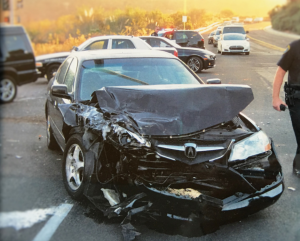How To Gain Pain & Suffering Reimbursement For Emotional Distress
In personal injury claims, the phrase “pain and suffering” describes a combination of the physical pain and emotional distress a victim suffers due to the accident and their injury. Emotional distress may be one of the most difficult injuries to prove in court and to insurance companies. Unlike a broken arm, there are no X-rays a doctor can point to. Let’s take a deeper look into psychological injuries one might face after a traumatic car crash, and how to substantiate a claim for emotional distress.
Psychological Impact of a Motor Vehicle Crash

However, general studies do indicate that approximately 9% of motor vehicle accident survivors develop post-traumatic stress disorder, which is commonly known as PTSD. With nearly 6.5 million reported crashes each year, this means 585,000 car accident survivors will experience some form of serious emotional distress such as PTSD, depression, substance abuse, anxiety disorder, mood swings, and phobias.
The Aftermath: Psychological Injuries Victims Face
Psychological injuries resulting from traumatic events such as a fatal accident, natural disaster, or violent assault are very common, especially if the event happened unexpectedly and the victim felt he/she could have prevented it. Several stressors may occur during the actual event, which may subsequently have consequences for the person:
- Threat to life and encounter with death
- Loss
- Feelings of helplessness
- Feeling responsible
- Inescapable horror (e.g. being trapped, jaws of life…)
People who experience post-crash emotional distress often describe feelings of denial, shock, grief, anger sadness, and fear. These feelings can lead to physical symptoms including flashbacks/nightmares, fatigue, tension, fear, and moodiness. How long people experience these symptoms also varies substantially. Some people report symptoms lasting for weeks or months, with the impact of the event gradually decreasing over time.
Other people are unable to find any relief, and the symptoms build until they become overwhelming. Unlike physical injuries that are usually apparent shortly after an accident, psychological injuries may not appear for months and become progressively worse if left untreated. Even if psychological injuries occur soon after the traumatic incident, others cannot see them. These injuries may go undetected and untreated by a professional. In an effort to cope with ongoing symptoms individuals often turn to alcohol, drugs, or make changes in their lifestyle such as withdrawing socially. They may also develop problems functioning in a job, they stop driving, or they are unable to be intimate.
Real-Life Example: When Psychological Injuries Outweigh the Physical

Within minutes the accident scene was deluged with flashing red lights and sirens. Jennifer was initially suspected of having neck and spine injuries. Paramedics immobilized her with a cervical collar and rigid spine board and transported her to a trauma center emergency room. The really good news — there were no traumatic neck or spine injuries, but only cuts, extensive bruising, and strains in her neck and back; all soft-tissue injuries that would heal within 3 months.
While Jennifer was recovering from her physical injuries she started to experience emotional and psychological changes. At first, she was very nervous about driving. Trips that been a part of her everyday life, such as driving to school or the grocery store, suddenly became impossibly difficult to endure. She had a constant fear of being killed in another crash. Nightmares of the car accident became real experiences that she would live over and over again. Her increasing fear of driving or being in cars changed her life. She began traveling by TriMet bus even though she had a car. When she did drive it was only during the day and for short distances. She refused to drive at night, on highways or in the passenger seat where she felt she had no control. She missed classes and finals because of overwhelming anxiety and fear. After suffering through these psychological injuries, Jennifer finally sought professional help. She was diagnosed with PTSD and received treatment for her emotional distress caused by the rollover car crash.
Jennifer’s case is a great example of an accident where the psychological injuries outweigh the physical injuries. Every personal injury accident has some amount of pain and suffering, but not every accident results in emotional distress and psychological injuries that require extensive medical treatment. It is common for these psychological injuries to materialize many months after the accident or traumatic event, and to do so in an ever increasing level of severity.
Do Insurance Companies Take Psychological Injuries Seriously?
While the facts seem straight forward, the at-fault driver’s insurance company saw the case as a simple soft-tissue injury car accident. They adopted the attitude of we are sorry it happened, but the claimant was not seriously injured and all of her scrapes and bruises are healed, so a few thousand dollars should cover her damages. In many cases, this low-ball tactic works and the injured person continues to live with the psychological injuries for years to come. In Jennifer’s case, it wasn’t until she sought legal help from me that the insurance company began to take the case seriously.
The legal case was built around the traumatic and violent nature of the rollover crash that occurred at highway speeds. This was the type of motor vehicle crash that most people would expect to see a fatality. Given the violent nature of the crash, and the sudden changes in Jennifer’s habits and lifestyle, there was substantial evidence to support the claim for PTSD and emotional distress. Testimony from Jennifer’s doctor, mental health therapist, co-workers, and family regarding her psychological injuries also helped support her diagnosis of PTSD. After the insurance company dismissed initial demands for settlement, a lawsuit was filed on Jennifer’s behalf, seeking damages for her physical injuries and psychological injuries resulting from the crash. After litigating the case thoroughly, we went to mediation and obtained a settlement for Jennifer for approximately 13 times the initial settlement offer.
How Can You Substantiate a Claim for Emotional Distress or Psychological Injuries?
In order to seek damages for emotional distress or psychological injuries caused by a serious personal injury, you must substantiate that you have a psychological injury and seek to quantify the impact of that injury on your life. It is not as simple as declaring that you have suffered emotional distress. No insurance company is going to write you a check for injuries you claim to have, but can’t substantiate. So how do you prove that you are fearful, have anxiety and nightmares, and no longer function in the same manner as you did prior to the traumatic incident? First, you must seek professional medical and/or psychological help. Starting with your family doctor or an emergency room doctor, seek help in dealing with your symptoms, and if necessary obtain a referral for more specific treatment from a licensed psychologist, psychiatrist or mental health therapist. Treatment may include counseling, therapy and sometimes medication. Second, keep a journal about how you are feeling and the impact the symptoms are having on your daily life. Third, seek help from your friends and family. Do not isolate or hide your symptoms from key family members.
All of the above resources should be able to help you with your psychological injuries and emotional distress. Further, they will be able to contribute information and insight into how the traumatic incident has affected your life. In other words, the medical experts, the journal and your friends, family and other people in your life can all substantiate the traumatic injury and its impact on your mental health.
SEEK ADVICE FROM AN OREGON PERSONAL INJURY LAWYER who knows how to deal with psychological injuries

I hope this website is a place to learn more about our law firm, as well as, an educational resource for Oregonians who have been victims of Oregon vehicle accidents and suffered emotional distress or psychological injuries. It is not intended to be legal advice, as every case is unique and should be accurately evaluated.
If you or someone you know has been injured as a result of another person’s conduct, and you are looking for a skilled attorney to lead you through the insurance and regulatory roadblocks, please call today for a free and confidential case evaluation. Local (503) 610-0005, Toll-free 1-800-949-1481 or email travis@mayorlaw.com.
For more information on car, truck, motorcycle, and bicycle accidents and related insurance issues, visit the following blog and web page articles:
